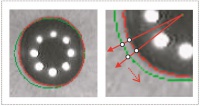Difference between revisions of "Iris Segmentation Code Based on the GST"
| Line 41: | Line 41: | ||
'''Please remember to cite reference [1] if you make use of this code in any publication'''. | '''Please remember to cite reference [1] if you make use of this code in any publication'''. | ||
| − | # F. Alonso-Fernandez, J. Bigun, “Iris Boundaries Segmentation Using the Generalized Structure Tensor. A Study on the Effects on Image Degradation”, Proc. [https://sites.google.com/a/nd.edu/btas_2012/ Intl Conf on Biometrics: Theory, Apps and Systems, BTAS,] Washington DC, September 23-26, 2012 ([http://hh.diva-portal.org/smash/record.jsf?searchId=2&pid=diva2:545745 link]) | + | # F. Alonso-Fernandez, J. Bigun, “Iris Boundaries Segmentation Using the Generalized Structure Tensor. A Study on the Effects on Image Degradation”, Proc. [https://sites.google.com/a/nd.edu/btas_2012/ Intl Conf on Biometrics: Theory, Apps and Systems, BTAS,] Washington DC, September 23-26, 2012 ([http://hh.diva-portal.org/smash/record.jsf?searchId=2&pid=diva2:545745 link to the publication]) |
# F. Alonso-Fernandez, J. Bigun, “Near-infrared and visible-light periocular recognition with Gabor features using frequency-adaptive automatic eye detection”, [http://digital-library.theiet.org/content/journals/iet-bmt, IET Biometrics], Volume 4, Issue 2, pp. 74-89, June 2015 ([http://digital-library.theiet.org/content/journals/10.1049/iet-bmt.2014.0038 link to the publication in IET Biometrics]) | # F. Alonso-Fernandez, J. Bigun, “Near-infrared and visible-light periocular recognition with Gabor features using frequency-adaptive automatic eye detection”, [http://digital-library.theiet.org/content/journals/iet-bmt, IET Biometrics], Volume 4, Issue 2, pp. 74-89, June 2015 ([http://digital-library.theiet.org/content/journals/10.1049/iet-bmt.2014.0038 link to the publication in IET Biometrics]) | ||
# C. Rathgeb, A. Uhl, P. Wild, "Iris Biometrics. From Segmentation to Template Security", Springer, 2013 | # C. Rathgeb, A. Uhl, P. Wild, "Iris Biometrics. From Segmentation to Template Security", Springer, 2013 | ||
# Z. He, T. Tan, Z. Sun, X. Qiu, "Toward accurate and fast iris segmentation for iris biometrics", IEEE Transactions on Pattern Analysis and Machine Intelligence, 2010, 31, (9), pp. 1295–1307 ([http://ieeexplore.ieee.org/xpl/login.jsp?tp=&arnumber=4586378&url=http%3A%2F%2Fieeexplore.ieee.org%2Fxpls%2Fabs_all.jsp%3Farnumber%3D4586378 link to the publication in IEEE Xplore]) | # Z. He, T. Tan, Z. Sun, X. Qiu, "Toward accurate and fast iris segmentation for iris biometrics", IEEE Transactions on Pattern Analysis and Machine Intelligence, 2010, 31, (9), pp. 1295–1307 ([http://ieeexplore.ieee.org/xpl/login.jsp?tp=&arnumber=4586378&url=http%3A%2F%2Fieeexplore.ieee.org%2Fxpls%2Fabs_all.jsp%3Farnumber%3D4586378 link to the publication in IEEE Xplore]) | ||
#J. Daugman, "New methods in iris recognition", IEEE Transactions on Systems, Man, and Cybernetics, Part B: Cybernetics, 37(5), 2007 ([http://ieeexplore.ieee.org/xpl/login.jsp?tp=&arnumber=4305270&url=http%3A%2F%2Fieeexplore.ieee.org%2Fxpls%2Fabs_all.jsp%3Farnumber%3D4305270 link to the publication in IEEE Xplore]) ([http://www.cl.cam.ac.uk/~jgd1000/NewMethodsInIrisRecog.pdf link to the publication in the author´s web site]) | #J. Daugman, "New methods in iris recognition", IEEE Transactions on Systems, Man, and Cybernetics, Part B: Cybernetics, 37(5), 2007 ([http://ieeexplore.ieee.org/xpl/login.jsp?tp=&arnumber=4305270&url=http%3A%2F%2Fieeexplore.ieee.org%2Fxpls%2Fabs_all.jsp%3Farnumber%3D4305270 link to the publication in IEEE Xplore]) ([http://www.cl.cam.ac.uk/~jgd1000/NewMethodsInIrisRecog.pdf link to the publication in the author´s web site]) | ||
Revision as of 23:05, 4 August 2015

| |
| Iris Segmentation Code | |
|---|---|
| Contact: Fernando Alonso-Fernandez |
Introduction
This page provides a software code for iris segmentation based on the Generalized Structure Tensor (GST). The software accepts as input grayscale and RGB images in any format supported by Matlab "imread" (uint8 only). It outputs the following information of the input iris image:
- Segmentation circles of the iris region (inner and outer boundaries) as well as eyelids (straight line)
- Irregular (non-circular) iris boundaries fitted by active contours
- Estimated eye center (computed at the beginning and used to guide segmentation of iris boundaries)
- Intermediate images after contrast normalization, specular reflection removal, and eyelash removal
- Complex edge map of the input image
- Binary segmentation mask
Terms and Conditions
This code has not any warranty and it is provided for research purposes only.
The code is provided in the form of executables compiled with Matlab r2009b 32 bits (mcc command) under Windows 8.1
Certain parameters of the code are customizable, please read the documentation included with the code for more information.
By downloading the code, you agree with the terms and conditions indicated above.
Download the code here
People responsible
- Fernando Alonso-Fernandez (contact person)
- Josef Bigun
References
Please remember to cite reference [1] if you make use of this code in any publication.
- F. Alonso-Fernandez, J. Bigun, “Iris Boundaries Segmentation Using the Generalized Structure Tensor. A Study on the Effects on Image Degradation”, Proc. Intl Conf on Biometrics: Theory, Apps and Systems, BTAS, Washington DC, September 23-26, 2012 (link to the publication)
- F. Alonso-Fernandez, J. Bigun, “Near-infrared and visible-light periocular recognition with Gabor features using frequency-adaptive automatic eye detection”, IET Biometrics, Volume 4, Issue 2, pp. 74-89, June 2015 (link to the publication in IET Biometrics)
- C. Rathgeb, A. Uhl, P. Wild, "Iris Biometrics. From Segmentation to Template Security", Springer, 2013
- Z. He, T. Tan, Z. Sun, X. Qiu, "Toward accurate and fast iris segmentation for iris biometrics", IEEE Transactions on Pattern Analysis and Machine Intelligence, 2010, 31, (9), pp. 1295–1307 (link to the publication in IEEE Xplore)
- J. Daugman, "New methods in iris recognition", IEEE Transactions on Systems, Man, and Cybernetics, Part B: Cybernetics, 37(5), 2007 (link to the publication in IEEE Xplore) (link to the publication in the author´s web site)